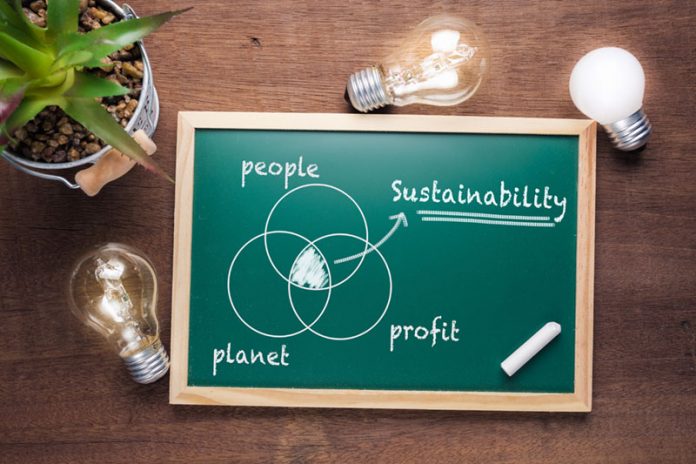Corporate sustainability: What is it? Well, the phrase corporate sustainably entails a method of self-regulation by businesses, large and small. This regulation ensures that their business practices are ethical and sustainable. Consumers are increasingly demanding and seeking responsible practices in the products and services that they consume. Thus, corporate sustainability is an all-encompassing term for the efforts that companies make to respond to these demands.
In short, there is no one single way for a company to practice corporate sustainability. The overarching goal is for companies to become more socially responsible in ways that are uniquely suited to their business practices or industry.
Corporate sustainability is a rapidly-growing phenomenon, accounting for $12 trillion in 2018, up from $8.7 trillion in 2016 (a 38 percent increase!). As corporations understand that their customer base demands social responsibility, they have found new ways to improve their products, services, and practices in sustainable ways.
What Are The Principles of Corporate Sustainability?
Corporate sustainability operates on three basic principles: the environmental, social, and economic pillars. These three principles all have essential impacts on the overall role of corporate sustainability. However, one or the other might be more of a priority for a given company.
The Environmental Pillar

The environmental pillar of corporate sustainability often gets the most attention and even the highest priority. As climate change and pollution increasingly become concerns, consumers have sought to buy from businesses that use sustainable, green practices.
The public has become increasingly aware that corporations, not individuals, have the largest carbon footprint. So they have started to demand accountability from the companies they patronize.
These companies have found that, by and large, improving green practices also saves money. This usually involves using less packaging, water, fuel, and other resources. Some corporations have made zero-waste pledges or begun to package their products in recycled material.
For other corporations, negating the environmental impact is not a possibility. Examples of these are companies in mining, food production, and textiles. These corporations also have options for improving green practices in other ways.
The main focus for such companies is reducing environmental impact as much as possible while continuing production. They may also implement benchmark practices to curb the usage of materials and resources.
The Social Pillar

The social pillar of corporate sustainability depends on the idea that corporations should consider group interests. This means making business choices that its customers, stakeholders, and employees support.
There are many ways that corporations can accomplish this. Businesses have sought to implement this pillar of corporate sustainability in a variety of ways. The main ways that they can practice this tenet is by providing fair treatment and just wages for their employees and giving back to their community.
Treating employees justly means providing a safe and fair workspace where employee needs are priorities. It also means that corporations should provide:
- Fair pay
- Appropriate benefits (including maternity and paternity leave)
- Scheduling options
- Opportunities for employee growth and development
Another part of the social pillar is to find ways to give back to the community. This can be either on a local or a global scale. Many businesses accomplish this by donating a percentage of their profits to charity. Others sponsor local causes, provide scholarships, or fundraise.
A final and crucial element of the social pillar is the ethical sourcing of products, especially regarding the supply chain. To be truly sustainable and ethical, corporations need to ensure that their products are not sourced or manufactured through exploitation. They are responsible for paying just wages, sourcing products ethically, and providing a safe workspace for every employee involved in their company.
The Economic Pillar

The last pillar of corporate sustainability is the economic pillar. This pillar relies on the first two points to guide and shape it. The economic pillar is also sometimes called the governance pillar since it deals with appropriate corporate governance.
The simple truth of business is that it must be profitable to stay sustainable. But corporate sustainability maintains that profit cannot be a priority ahead of the social and environmental pillars.
The economic pillar concerns itself with activities like:
- Compliance
- Governance
- Risk management
So what, exactly, does this mean?
In essence, this third pillar exists to ensure that the corporation’s practices and goals are in line with those of its community. That includes shareholders, employees, customers, and everyone else involved in production and distribution.
What this means is that corporations need to work transparently regarding both business and financial practices. It also means that shareholders have the opportunity to vote on essential issues and that the company practices ethical hiring methods and avoids illegal activities.
The third pillar also helps balance the first two pillars. While changes need to happen, companies must find ways to implement them strategically to maintain profitability. The economic pillar helps them find ways to become sustainable in practical and viable ways.
Some Examples of Corporate Sustainability
With the many options for practicing corporate sustainability, what are some examples? Some companies have the resources to make widespread, sweeping changes. But even small businesses can make changes to become more socially, environmentally, and economically sustainable.
What Other Companies Have Done
Some of the world’s largest corporations have made significant changes to their business practices to become more sustainable. Some of these include:
- Lego: In the last years, Lego has funneled millions of dollars into efforts to combat climate change. It has also changed its corporate policies to reduce waste, such as reducing the amount of packaging it uses and switching to green materials. It has also made investments in alternative energy sources.
- Johnson & Johnson: The company has increased attempts to reduce its carbon footprint through alternative energy. It has also begun charity efforts to provide communities with clean, potable water.
- Google: The search engine has increased its investments in renewable energy alternatives and is building its offices with sustainable practices.
- TOMS: The footwear company has pledged to donate one-third of its net profits to charities. These charities support efforts to improve access to physical and mental healthcare and education. In 2020, the company switched its charitable efforts toward focusing on COVID-19 relief.
- Pfizer: The pharmaceutical company has many charitable healthcare initiatives to educate communities worldwide and improve healthcare accessibility to impoverished regions.
- Starbucks: The coffee chain has increased efforts to hire veterans, young people, and refugees as well as become “resource positive” by storing more carbon than they emit, eliminating waste when possible, and providing more clean freshwater than they use. Their goal is to have a 50% reduction in carbon emissions, water, and landfill waste by 2030.
What Small Businesses Can Do
Small businesses, of course, do not have the funds or resources that large corporations do. For this reason, some small business owners may not know how to make their company more socially responsible.

Luckily, there are many ways to practice corporate sustainability on a smaller level. These practices can not only improve your community but also benefit your business’ profits and reputation.
Here are some ways that small businesses can practice corporate sustainability:
- Go paperless
- Use a LEED-certified office space
- Partner with like-minded small businesses
- Make charitable donations
- Pay employees fairly
- Provide a safe and flexible workspace
- Reduce resources and increase green initiatives
- Buy used office equipment
- Improve the community
- Reduce energy usage
Benefits of Corporate Sustainability
There are obvious benefits to global and local communities from practicing corporate sustainability. But the truth is that these practices also make financial sense for companies.
Practicing social corporate sustainability, for example, means having more satisfied employees. This, in turn, leads to higher employee satisfaction and loyalty. Companies save money by treating employees well because worker retention rises and turnover decreases.
The efforts that fall under the broad category of corporate sustainability are so many that, as you can imagine, the impacts are incalculable. Naturally, investors and shareholders want to know what these changes will do to their investment.
In terms of how corporate sustainability practices affect businesses themselves, these results are easier to quantify. The most significant impact of these practices is the effect on a business’s reputation.
By implementing better business practices, companies have the chance to improve their public image and reputation. Consumers want to trust corporations when they believe that they have public interest and ethical practices at heart.
It’s likely that as consumers become more aware of the importance of sustainable and environmentally-friendly practices in companies, businesses that do not implement these strategies may eventually have to deal with a failing reputation, if not market penalties.
Wrapping Up
Corporate sustainability is a new and ever-growing concept. There are countless practices that businesses can put in place to be more socially and environmentally responsible, whether they are large corporations with large carbon footprints or small, local businesses. Not only is this better for global communities and the planet, but it is also better for business.
Increasingly, consumers demand ethical practices of the businesses that they patronize. Corporations may soon find themselves needing to implement corporate sustainability practices whether they want to or not. But considering the financial and global impact of such practices, they are in everyone’s best interest, as well as the planet’s.














